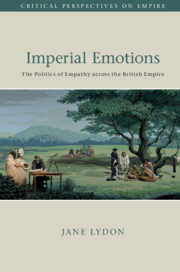Book contents
- Imperial Emotions
- Critical Perspectives on Empire
- Imperial Emotions
- Copyright page
- Dedication
- Contents
- Figures
- Acknowledgements
- Introduction: Emotions and Empire
- 1 Children of Empire: British Nationalism and Colonial Utopias
- 2 Colonial ‘Blind Spots’: Images of Frontier Conflict
- 3 Australian Uncle Tom’s Cabins
- 4 The Homeless of Empire: Imperial Outcasts in Bleak House
- 5 Christian Heroes on the New Frontier
- 6 Charity Begins at Home: Philanthropy, Magic Lantern Slides and Missionary Performances
- 7 The Republican Debate and Popular Royalism: ‘a Strange Reluctance to Actually Shout at the Queen’
- Bibliography
- Index
6 - Charity Begins at Home: Philanthropy, Magic Lantern Slides and Missionary Performances
Published online by Cambridge University Press: 30 September 2019
- Imperial Emotions
- Critical Perspectives on Empire
- Imperial Emotions
- Copyright page
- Dedication
- Contents
- Figures
- Acknowledgements
- Introduction: Emotions and Empire
- 1 Children of Empire: British Nationalism and Colonial Utopias
- 2 Colonial ‘Blind Spots’: Images of Frontier Conflict
- 3 Australian Uncle Tom’s Cabins
- 4 The Homeless of Empire: Imperial Outcasts in Bleak House
- 5 Christian Heroes on the New Frontier
- 6 Charity Begins at Home: Philanthropy, Magic Lantern Slides and Missionary Performances
- 7 The Republican Debate and Popular Royalism: ‘a Strange Reluctance to Actually Shout at the Queen’
- Bibliography
- Index
Summary
Magic lantern slide performances became an important means of communicating across the empire, and during the 1890s British campaigners pleading for the metropolitan waif competed with local missionaries seeking to arouse compassion for Aboriginal people. Their visual and rhetorical strategies sought to secure public sympathy for their very different causes, through a range of emotional effects, with larger implications for imperial identities. The London-based Barnardo’s orphanages successfully raised funds in the Australian colonies through travelling performances aiming to arouse pity for the metropolitan poor by combining slum sensation with documentary force. White settler audiences were asked to administer relief to the waifs of the Mother Country. During these years such performances competed with Australian missionaries such as John Brown Gribble, who travelled widely to tell the story of his mission work and raise funds for his new settlement, Yarrabah, in north Queensland. Gribble was, however, challenged on the grounds of telescopic philanthropy to re-assert a racialist hierarchy and ridicule humanitarianism. This dynamic shows how emotional narratives worked to construct imperial relations, contest national or cosmopolitan world-views, and simultaneously constitute metropolitan and colonial culture.
- Type
- Chapter
- Information
- Imperial EmotionsThe Politics of Empathy across the British Empire, pp. 143 - 163Publisher: Cambridge University PressPrint publication year: 2019



